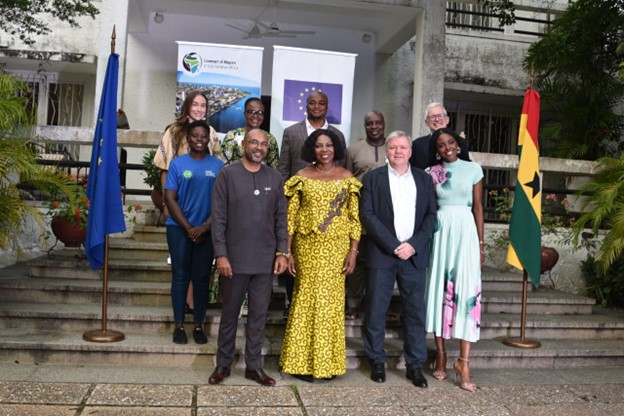The European Union (EU) Ambassador to Ghana, Irchad Razaaly, has emphasised the importance of promoting carbon pricing as a vital strategy for financing the transition to a green and sustainable economy.
The EU is expected to encourage carbon pricing adoption as a “cost-effective tool” to reduce emissions and raise revenue for the move toward a greener future at COP28, scheduled to be held in Dubai later this week.
Speaking in Accra after a EU roundtable Climate Diplomacy Week with Ghanaian mayors and representatives from Accra, Tema, Sekondi-Takoradi, Ningo-Prampram and Awutu Senya East, Mr. Razaaly stated that the EU will also call on all countries to progress in the implementation of loss and damage financing mechanisms.
Carbon pricing is globally recognised as an effective tool for incentivising businesses and industries to reduce their carbon footprint.
By assigning a monetary value to carbon emissions, this approach encourages companies to adopt cleaner practices and invest in eco-friendly technologies, Razaaly stated.
“These, we believe, can be two powerful mechanisms helping to accelerate climate mitigation through stronger motivation from the private sector and better financing for damages due to climate change,” he added.
Ghana has actively worked toward enhancing its environmental policies and embracing renewable energy sources.
The Roundtable
The roundtable brought together Elizabeth Sackey, Mayor of Accra Metropolitan Assembly; Anita Love Obo Amissah, Municipal Chief Executive of Awutu-Senya East Municipal Assembly; Yohane Amarh Ashitey, Mayor of Tema Metropolitan Assembly; Innocent Haligah, Metropolitan Coordinating Director of Sekondi-Takoradi Metropolitan Assembly; and Al-Latiff Tetteh Amanor, District Chief Executive of Ningo-Prampram District Assembly.
The mayors – members of the Covenant of Mayors in sub-Saharan Africa (CoM SSA) initiative – acknowledged the pressing challenges posed by rapid urbanisation and population growth during the discussion, and emphasised the need for collaborative efforts to find sustainable solutions.
The European Union Climate Diplomacy Week, an integral part of the annual global campaign initiated by the EU and its member-states, aims to promote cooperation on climate change and inspire tangible actions.
Supporting Ghanaian Cities
Commenting on the discussions during the roundtable, Razaaly emphasised the EU’s commitment to supporting Ghana’s cities in their journey toward sustainable development.
“The roundtable was a testament to our collective resolve in tackling climate challenges head-on. It’s crucial that these local insights and experiences from Ghana are brought forth at the upcoming COP28 to ensure global climate strategies resonate with local realities,” he stated. Elizabeth Sackey, the first female Mayor of Accra, reflected on the event’s significance, saying: “This roundtable has been a powerful platform for us to unite our voices and concerns. As we approach COP28, it’s clear that the challenges we face in Accra are shared by many; and, together, we can advocate for meaningful global action and support”.
The event emphasised the need for innovative climate solutions and robust support systems, especially in climate finance and sustainable energy – but also increased investment in cities to fight against floods. Yohane Amarh Ashitey, Mayor of Tema Metropolitan Assembly noted: “Our cities are at the frontline of climate impacts; today’s dialogue has reinforced the necessity for innovative approaches and enhanced support to tackle these challenges effectively”.
CoM SSA
CoM SSA is the regional chapter of Global Covenant of Mayors for Climate and Energy (GCOM), the largest global initiative of cities addressing climate and energy challenges. This bottom-up initiative encourages cities to voluntarily set and achieve ambitious yet realistic climate and energy targets.
As of 2023, the network includes over 350 cities in sub-Saharan Africa. Since January 2019, the initiative is co-funded by the European Union, German Ministry of Economic Cooperation and Development (BMZ) and Agencia Española de Cooperación Internacional para el Desarrollo (AECID), with a total funding amount of €35.7million providing in-depth support to cities in 14 countries including Ghana.
It is jointly implemented by four European member-state organisations: GIZ, AECID, AFD and Expertise France.










